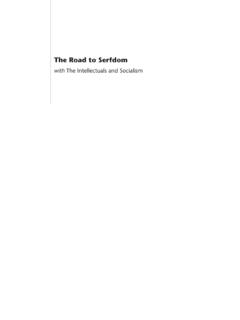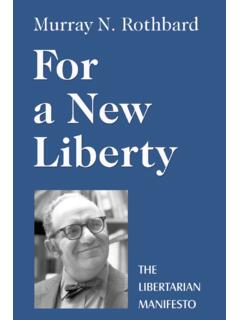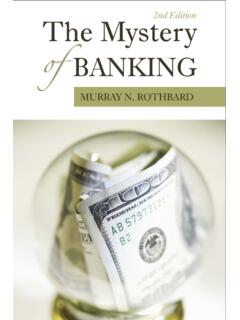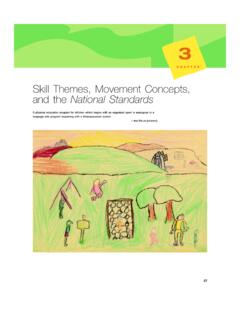Transcription of The Law - Mises Institute
1 THELAWTHELAWFR D RICBASTIATL udwig von Mises InstituteAuburn, AlabamaCover: Prise de la Bastille( The Storming of the Bastille );1789. Painting by Jean-Pierre Ho el (1735 1813). Permissionwas obtained from the Biblioth que nationale de France for 2007 by the Ludwig von Mises in by the Ludwig von Mises Institute518 West Magnolia Avenue, Auburn, Alabama : 978-1-933550-14-5 FOREWORDA nyone building a personal library of liberty mustinclude in it a copy of Fr d ric Bastiat s classicessay, the law . First published in 1850 by thegreat French economist and journalist, it is as clear a state- ment as has ever been made of the original American idealof government, as proclaimed in the Declaration of Inde-pendence, that the main purpose of any government is theprotection of the lives, liberties, and property of its citizens.
2 Bastiat believed that all human beings possessed theGod-given, natural rights of individuality, liberty, prop-erty. This is man, he wrote. These three gifts fromGod precede all human legislation. But even in histime writing in the late 1840s Bastiat was alarmedover how the law had been perverted into an instru - ment of what he called legal plunder. Far from protectingindividual rights, the law was increasingly used to depriveone group of citizens of those rights for the benefit ofanother group, and especially for the benefit of the stateitself.
3 He condemned the legal plunder of protectionistvtariffs, government subsidies of all kinds, progressive tax-ation, public schools, government jobs programs, mini-mum wage laws, welfare, usury laws, and s warnings of the dire effects of legal plunderare as relevant today as they were the day he first issuedthem. The system of legal plunder (which many now cel-ebrate as democracy ) will erase from everyone s con-science, he wrote, the distinction between justice andinjustice. The plundered classes will eventually figure outhow to enter the political game and plunder their fellowman.
4 Legislation will never be guided by any principles ofjustice, but only by brute political force. The great French champion of liberty also forecast thecorruption of education by the state. Those who held government-endowed teaching positions, he wrote,would rarely criticize legal plunder lest their governmentendowments be ended. The system of legal plunder would also greatly exag-gerate the importance of politics in society. That would bea most unhealthy development as it would encourage evenmore citizens to seek to improve their own well-being notby producing goods and services for the marketplace butby plundering their fellow citizens through was also wise enough to anticipate what mod-ern economists call rent seeking and rent avoidance behavior.
5 These two clumsy phrases refer, respectively, tothe phenomena of lobbying for political favors (legalplunder), and of engaging in political activity directed atprotecting oneself from being the victim of plunder seek-ers. (For example, the steel manufacturing industry lob-bies for high tariffs on steel, whereas steel-using indus-tries, like the automobile industry, can be expected tolobby against high tariffs on steel). viThe LawThe reason why modern economists are concernedabout rent seeking is the opportunity cost involved: themore time, effort and money that is spent by businesseson conniving to manipulate politics merely transferringwealth the less time is spent on producing goods andservices, which increases wealth.
6 Thus, legal plunderimpoverishes the entire society despite the fact that asmall (but politically influential) part of the society bene-fits from it. It is remarkable, in reading the law , how perfectlyaccurate Bastiat was in describing the statists of his daywhich, it turns out, were not much different from the sta-tists of today or any other day. The French socialists ofBastiat s day espoused doctrines that perverted charity,education, and morals, for one thing. True charity doesnot begin with the robbery of taxation, he pointed schooling is inevitably an exercise in statistbrainwashing, not genuine education; and it is hardly moral for a large gang (government) to (legally) rob onesegment of the population, keep most of the loot, andshare a little of it with various needy individuals.
7 Socialists want to play God, Bastiat observed, antic-ipating all the future tyrants and despots of the world whowould try to remake the world in their image, whetherthat image would be communism, fascism, the gloriousunion, or global democracy. Bastiat also observed thatsocialists wanted forced conformity; rigid regimentationof the population through pervasive regulation; forcedequality of wealth; and dictatorship. As such, they werethe mortal enemies of liberty. Dictatorship need not involve an actual that was needed, said Bastiat, was the laws, enactedFr d ric Bastiatviiby a Congress or a Parliament, that would achieve thesame effect: forced conformity.
8 Bastiat was also wise to point out that the world hasfar too many great men, fathers of their countries, etc., who in reality are usually nothing but petty tyrantswith a sick and compulsive desire to rule over others. Thedefenders of the free society should have a healthy disre-spect for all such men. Bastiat admired America and pointed to the America of1850 as being as close as any society in the world to hisideal of a government that protected individual rights tolife, liberty, and property.
9 There were two major exeptions,however: the twin evils of slavery and protectionist tariffs. Fr d ric Bastiat died on Christmas Eve, 1850, and didnot live to observe the convulsions that the America headmired so much would go through in the next fifteenyears (and longer). It is unlikely that he would have con-sidered the government s military invasion of theSouthern states in 1861, the killing of some 300,000 citi-zens, and the bombing, burning, and plundering of theregion s cities, towns, farms, and businesses as being con-sistent in any way with the protection of the lives, liber-ties and properties of those citizens as promised by theDeclaration of Independence.
10 Had he lived to see all ofthis, he most likely would have added legal murder to legal plunder as one of the two great sins of govern- ment . He would likely have viewed the post-war Republi-can Party, with its 50 percent average tariff rates, its mas-sive corporate welfare schemes, and its 25-year campaignof genocide against the Plains Indians as first-rate plun-derers and traitors to the American ideal. In the latter pages of the law Bastiat offers thesage advice that what was really needed was a science ofviiiThe Laweconomics that would explain the harmony (or lackthereof) of a free society (as opposed to socialism).















